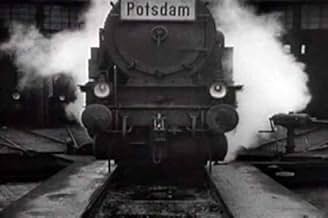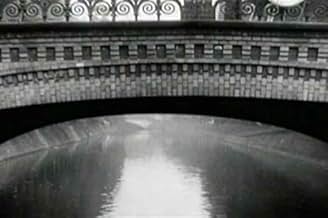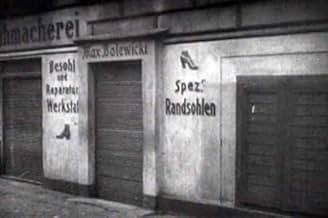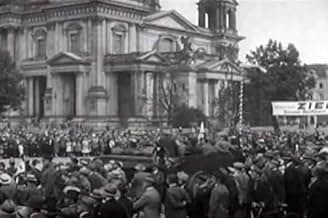IMDb RATING
7.6/10
5.1K
YOUR RATING
This movie shows us one day in Berlin, the rhythm of that time, starting at the earliest morning and ends in the deepest night.This movie shows us one day in Berlin, the rhythm of that time, starting at the earliest morning and ends in the deepest night.This movie shows us one day in Berlin, the rhythm of that time, starting at the earliest morning and ends in the deepest night.
- Director
- Writers
- Star
Paul von Hindenburg
- Self
- (uncredited)
- Director
- Writers
- All cast & crew
- Production, box office & more at IMDbPro
Featured reviews
Berlin, Symphony of a City is a remarkable historical document of the mighty city before its Wagnerian capitulation within less than twenty years of its filming. Along with Paris, Berlin was the epicenter of a Europe emerging from World War 1 into the Roaring Twenties and director Walter Ruttman for the most part captures the energy and pace of the 20th century metropolis.
Moving from morning to night Symphony emphasizes the cities industrial muscle but also divides evenly portraits of the have and have nots of Berlin, the grime as well as the glitter. It is a city on the move and move it does from the crowded sidewalks to the congested avenues and its varied populace . It is in the faces of these Berliners that the film holds its greatest fascination for me watching children playing and youth sporting events with the knowledge that most of them will be of draft age for the oncoming conflagration that will reduce this city to rubble.
The documentary does have problems with some scenes clearly staged (in one case a suicide filmed in close-up) and a roller coaster scene is overlong but overall when put into historical context this is a valuable visual document of a city that is extinct as Atlantis.
Moving from morning to night Symphony emphasizes the cities industrial muscle but also divides evenly portraits of the have and have nots of Berlin, the grime as well as the glitter. It is a city on the move and move it does from the crowded sidewalks to the congested avenues and its varied populace . It is in the faces of these Berliners that the film holds its greatest fascination for me watching children playing and youth sporting events with the knowledge that most of them will be of draft age for the oncoming conflagration that will reduce this city to rubble.
The documentary does have problems with some scenes clearly staged (in one case a suicide filmed in close-up) and a roller coaster scene is overlong but overall when put into historical context this is a valuable visual document of a city that is extinct as Atlantis.
Berlin: City Symphony is one of those early experiments in montage - early as in before sound was invented and right after Battleship Potemkin changed everything. It's not always montage, as some might believe from its recommendations (i.e. Koyannasquati), as the director Walter Ruttmann is making documentary as much as city-scape. It's about a full day and night among the dwellers and the objects of a city: the moving trains, the people shuffling by about their various concerns, and the people at jobs and things like a factory at work and phones being answered used for editing fodder.
Some of this is dazzling work, cut and speed up to reflect a mood of a city that is vibrant and hectic, imaginative and crazy, and sometimes tending for the dramatic. Ruttmann also has a rather weird design with the pacing at times; a woman in one 'scene' looks over a river, and in a state of sorrow falls over. People rush over to see what has happened, and we see a shot of the water and the woman gone under... and then it cuts right away to a beauty pageant! It throws a viewer off to see Ruttmann's unconventional choices, and how images flow together like the racers (cars, horses, people, boxcars), and there develops a simple but engrossing poetry of people as "actors" in front of a camera on their daily travels or having fun like at the funshow in the auditorium. It's not always as exciting or delirious as a Russian counterpart like Man with a Movie Camera or Kino Eye, but it pays loving tribute to its city at its time and place, showing the light with the dark, the commonplace with the unusual.
Some of this is dazzling work, cut and speed up to reflect a mood of a city that is vibrant and hectic, imaginative and crazy, and sometimes tending for the dramatic. Ruttmann also has a rather weird design with the pacing at times; a woman in one 'scene' looks over a river, and in a state of sorrow falls over. People rush over to see what has happened, and we see a shot of the water and the woman gone under... and then it cuts right away to a beauty pageant! It throws a viewer off to see Ruttmann's unconventional choices, and how images flow together like the racers (cars, horses, people, boxcars), and there develops a simple but engrossing poetry of people as "actors" in front of a camera on their daily travels or having fun like at the funshow in the auditorium. It's not always as exciting or delirious as a Russian counterpart like Man with a Movie Camera or Kino Eye, but it pays loving tribute to its city at its time and place, showing the light with the dark, the commonplace with the unusual.
10J. Steed
Classic and splendid film that is still fascinating to watch. Walter Ruttmann did not make a documentary about Berlin, although 75 after date it certainly can be considered a document about a Berlin that is no more, he composed a film that tries to catch the essence of the atmosphere of a big city. The film is a good example of the art style Neue Sachlichkeit (functionalism): it is a cross-section of Berlin's life in which every element is equally important, shown without comment and in its totality it is the expression of the joy of Berlin's life. It is not a film about the life of Berliners, it is Berlin seen as a living mechanism.
The subtitle referring to Großstadt (big city) is the key, it could have been any other city. The idea as such is not the makers' prerogative. Elsewhere the fascination with the hustle and bustle of the big city was also present as was the idea to catch this on this film and in music: e.g. Cavalcanti in France made a film about Paris and the US Ferde Grofé composed his musical suite Metropolis (1927) with New York in his mind. The irony of all these endeavours is that the film or music is abstract, but that the result is a romanticizing view.
Ruttmann made several abstract film and he refers to them in the beginning with abstract horizontal lines dissolving to rail way tracks. In my view the rest of the film is also abstract. Although we see real people and situations the brilliant editing constantly keeps the film abstract: the situation and the people in a shot are not important, important is the juxtaposition to other shots: is the composition varied enough?. Thus we see a filmic composition (in stead of a musical one) and the subtitle Symphony is just. As with every composition the theme has to be modulated to keep it interesting and it is here where the weakness of the film is. The building up from the start and elaboration up to the beginning of the afternoon is splendid, precise and exiting; but from that point it bogs down for a while: we see another shop, another street etc. without adding much to what already was. It may be that Ruttmann was aware of this, note how quickly he finishes the afternoon to continue with the night-life and then immediately all the excitement and filmic fun is back.
In an 1939 interview cameraman Karl Freund said that everything possible was filmed using only candid cameras. I have my doubts. Let's take for example the sequence of the drowning lady: how could he make an extreme close-up with a hidden camera in such a brilliant angle? (By the way: if she really tried to commit suicide, was Freund himself not only one of the gaping bystanders without doing anything to save her?) How could he foresee the right angle to film the prostitute picking up her client near the cornered shop window? Not that it matters for the quality of the film, but it proofs the old adagium: filming is deceiving.
The subtitle referring to Großstadt (big city) is the key, it could have been any other city. The idea as such is not the makers' prerogative. Elsewhere the fascination with the hustle and bustle of the big city was also present as was the idea to catch this on this film and in music: e.g. Cavalcanti in France made a film about Paris and the US Ferde Grofé composed his musical suite Metropolis (1927) with New York in his mind. The irony of all these endeavours is that the film or music is abstract, but that the result is a romanticizing view.
Ruttmann made several abstract film and he refers to them in the beginning with abstract horizontal lines dissolving to rail way tracks. In my view the rest of the film is also abstract. Although we see real people and situations the brilliant editing constantly keeps the film abstract: the situation and the people in a shot are not important, important is the juxtaposition to other shots: is the composition varied enough?. Thus we see a filmic composition (in stead of a musical one) and the subtitle Symphony is just. As with every composition the theme has to be modulated to keep it interesting and it is here where the weakness of the film is. The building up from the start and elaboration up to the beginning of the afternoon is splendid, precise and exiting; but from that point it bogs down for a while: we see another shop, another street etc. without adding much to what already was. It may be that Ruttmann was aware of this, note how quickly he finishes the afternoon to continue with the night-life and then immediately all the excitement and filmic fun is back.
In an 1939 interview cameraman Karl Freund said that everything possible was filmed using only candid cameras. I have my doubts. Let's take for example the sequence of the drowning lady: how could he make an extreme close-up with a hidden camera in such a brilliant angle? (By the way: if she really tried to commit suicide, was Freund himself not only one of the gaping bystanders without doing anything to save her?) How could he foresee the right angle to film the prostitute picking up her client near the cornered shop window? Not that it matters for the quality of the film, but it proofs the old adagium: filming is deceiving.
It's like Koyaanisqatsi of 20s! It's miraculous! Awesome! It's all about the idea of a great city moving forward up-tempo but still having quite common problems of Germany's twenties poverty and exacerbation, nevertheless Berlin being one of the most fashionable cities of Europe of that particular time. But it's not the movie's main account. Its atmosphere was created by excellent cameraman work. The frame when a train moves right into you and then suddenly turns away is quite impressive. Never seen that advanced cameraman till Citizen Kane. I'd also definitely recommend watching Ruttmann's 'Lichtspiel Opus I ', an avant-garde animated movie created in 1921.
This is a very straightforward and pleasant silent picture that delivers exactly what it promises. Namely: footage of Berlin, its residents, and the whole spectrum of city activities during an ordinary day in 1927. If you have any interest in seeing real life in Weimar Germany, this film is an excellent rental. It opens with an Eisensteinian-style montage sequence, as a train approaches the city. Upon its arrival in Berlin's Union Station, the city is remarkably desolate. As the film progresses, the city begins to wake up, and you are shown residents at work (mostly in factories) and leisure. You will see shopkeepers, businessmen, restauranteurs, policemen, soldiers, politicians; children at play and even some vagrants. The acts become gradually more harsh as the film progresses, with mildly unpleasant imagery beginning to creep in (e.g. shots of dogs fighting, footage of beggars, litter, an arrest, etc.), only to gracefully recede as the film reaches its closing. The final act shows Berlin's night life, which is as lavish and swinging as anything in our own "Roaring 20's." This is an impeccable time capsule and it has something to offer both film and history buffs. Berlin was truly a world city at this time, and it was extremely interesting to see everything in the Weimar's Golden period, before Hitler and the destruction that followed. Technically speaking, it is a very well made and restored film; the footage is crisp and the music was never overwhelming. This is a really easy film to appreciate and it is definitely worthwhile, particularly for history buffs. Highly recommended. ---|--- Reviews by Flak Magnet
Did you know
- TriviaThe shooting was done over 18 months though the resulting feature gives the impression of just one day in the city.
- ConnectionsFeatured in Lulu in Berlin (1984)
- How long is Berlin: Symphony of Metropolis?Powered by Alexa
Details
- Release date
- Country of origin
- Language
- Also known as
- Berlin: Symphony of a Metropolis
- Filming locations
- Berlin Cathedral, Mitte, Berlin, Germany(aka Berliner Dom)
- Production companies
- See more company credits at IMDbPro
- Runtime
- 1h 5m(65 min)
- Color
- Sound mix
- Aspect ratio
- 1.33 : 1
Contribute to this page
Suggest an edit or add missing content





















